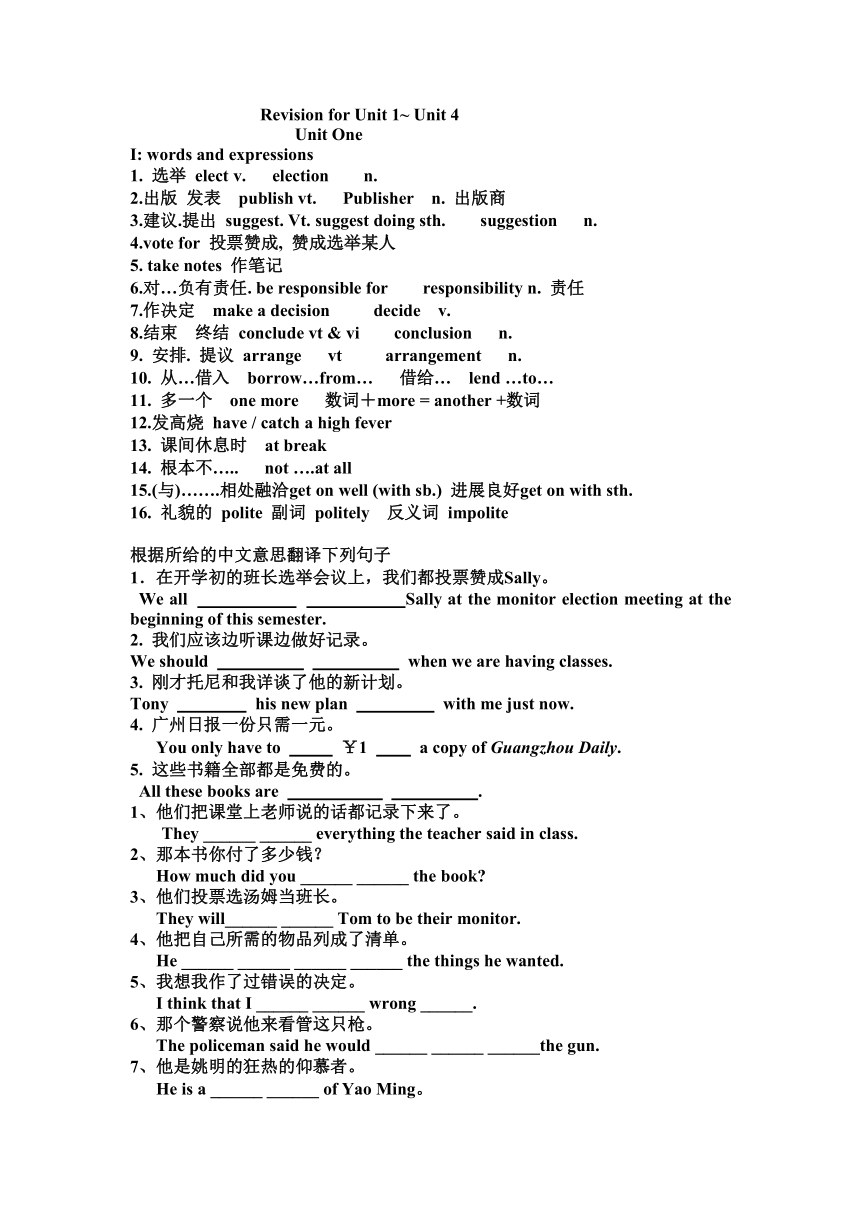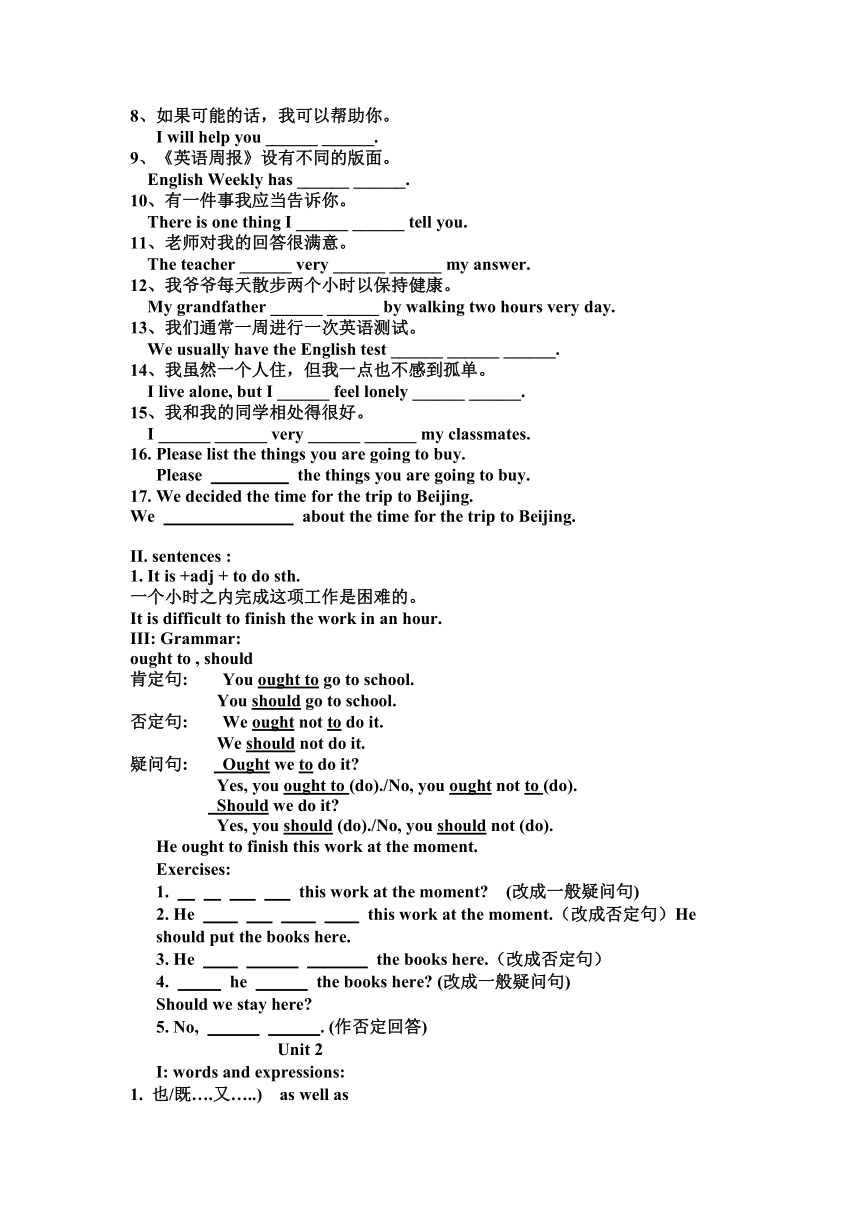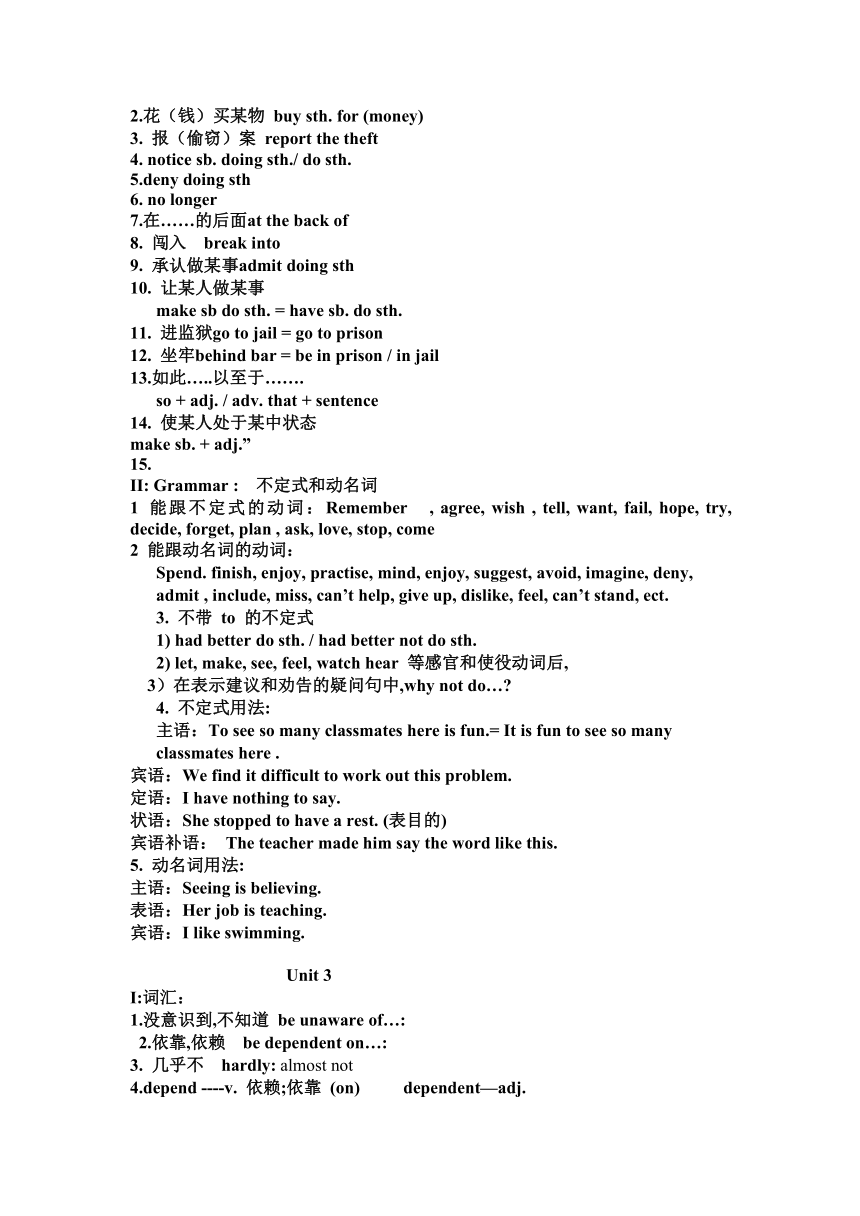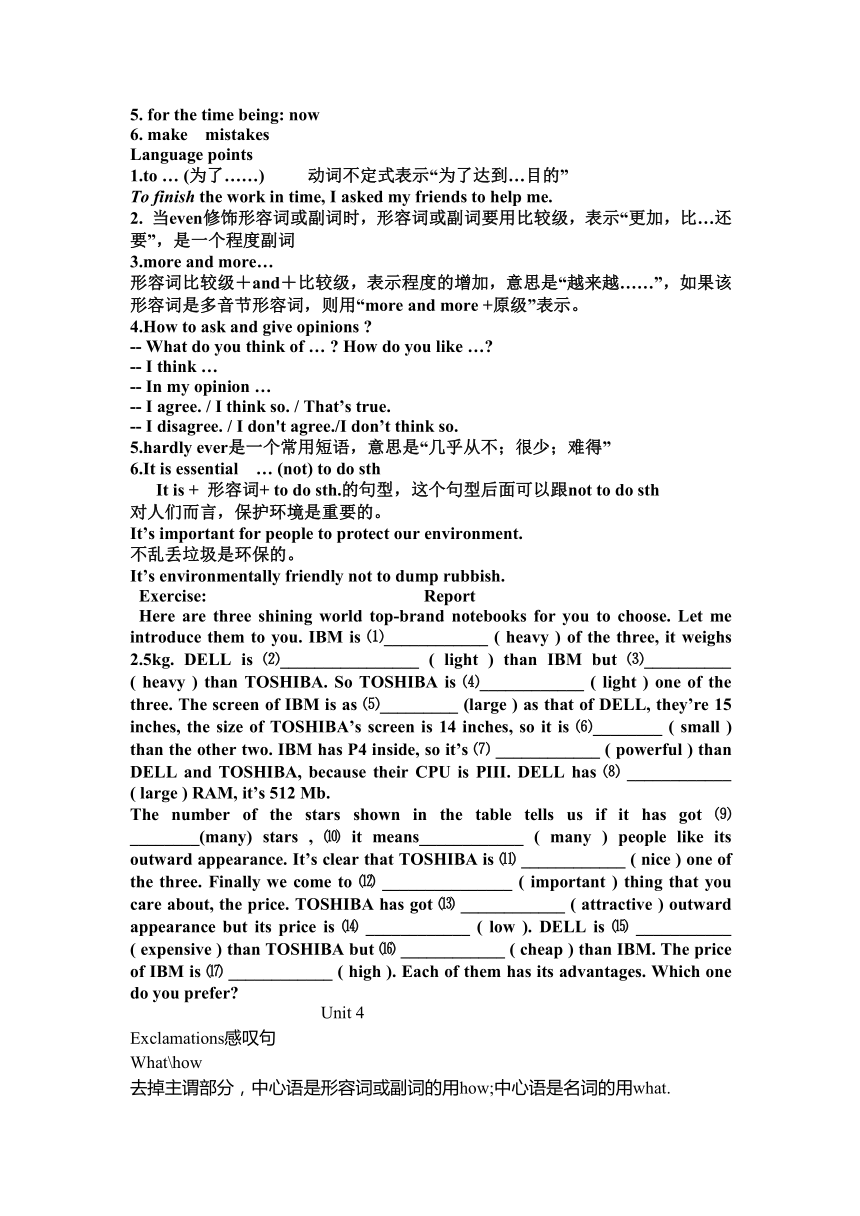牛津英语(广州版)8A-revision for Unit One-Unit Five
文档属性
| 名称 | 牛津英语(广州版)8A-revision for Unit One-Unit Five |

|
|
| 格式 | rar | ||
| 文件大小 | 20.0KB | ||
| 资源类型 | 教案 | ||
| 版本资源 | 其它版本 | ||
| 科目 | 英语 | ||
| 更新时间 | 2009-02-13 18:40:00 | ||
图片预览




文档简介
Revision for Unit 1~ Unit 4
Unit One
I: words and expressions
1. 选举 elect v. election n.
2.出版 发表 publish vt. Publisher n. 出版商
3.建议.提出 suggest. Vt. suggest doing sth. suggestion n.
4.vote for 投票赞成, 赞成选举某人
5. take notes 作笔记
6.对…负有责任. be responsible for responsibility n. 责任
7.作决定 make a decision decide v.
8.结束 终结 conclude vt & vi conclusion n.
9. 安排. 提议 arrange vt arrangement n.
10. 从…借入 borrow…from… 借给… lend …to…
11. 多一个 one more 数词+more = another +数词
12.发高烧 have / catch a high fever
13. 课间休息时 at break
14. 根本不….. not ….at all
15.(与)…….相处融洽get on well (with sb.) 进展良好get on with sth.
16. 礼貌的 polite 副词 politely 反义词 impolite
根据所给的中文意思翻译下列句子
1.在开学初的班长选举会议上,我们都投票赞成Sally。
We all Sally at the monitor election meeting at the beginning of this semester.
2. 我们应该边听课边做好记录。
We should when we are having classes.
3. 刚才托尼和我详谈了他的新计划。
Tony his new plan with me just now.
4. 广州日报一份只需一元。
You only have to ¥1 a copy of Guangzhou Daily.
5. 这些书籍全部都是免费的。
All these books are .
1、他们把课堂上老师说的话都记录下来了。
They ______ ______ everything the teacher said in class.
2、那本书你付了多少钱?
How much did you ______ ______ the book
3、他们投票选汤姆当班长。
They will______ ______ Tom to be their monitor.
4、他把自己所需的物品列成了清单。
He ______ ______ ______ ______ the things he wanted.
5、我想我作了过错误的决定。
I think that I ______ ______ wrong ______.
6、那个警察说他来看管这只枪。
The policeman said he would ______ ______ ______the gun.
7、他是姚明的狂热的仰慕者。
He is a ______ ______ of Yao Ming。
8、如果可能的话,我可以帮助你。
I will help you ______ ______.
9、《英语周报》设有不同的版面。
English Weekly has ______ ______.
10、有一件事我应当告诉你。
There is one thing I ______ ______ tell you.
11、老师对我的回答很满意。
The teacher ______ very ______ ______ my answer.
12、我爷爷每天散步两个小时以保持健康。
My grandfather ______ ______ by walking two hours very day.
13、我们通常一周进行一次英语测试。
We usually have the English test ______ ______ ______.
14、我虽然一个人住,但我一点也不感到孤单。
I live alone, but I ______ feel lonely ______ ______.
15、我和我的同学相处得很好。
I ______ ______ very ______ ______ my classmates.
16. Please list the things you are going to buy.
Please the things you are going to buy.
17. We decided the time for the trip to Beijing.
We about the time for the trip to Beijing.
II. sentences :
1. It is +adj + to do sth.
一个小时之内完成这项工作是困难的。
It is difficult to finish the work in an hour.
III: Grammar:
ought to , should
肯定句: You ought to go to school.
You should go to school.
否定句: We ought not to do it.
We should not do it.
疑问句: Ought we to do it
Yes, you ought to (do)./No, you ought not to (do).
Should we do it
Yes, you should (do)./No, you should not (do).
He ought to finish this work at the moment.
Exercises:
1. this work at the moment (改成一般疑问句)
2. He this work at the moment.(改成否定句)He should put the books here.
3. He the books here.(改成否定句)
4. he the books here (改成一般疑问句)
Should we stay here
5. No, . (作否定回答)
Unit 2
I: words and expressions:
1. 也/既….又…..) as well as
2.花(钱)买某物 buy sth. for (money)
3. 报(偷窃)案 report the theft
4. notice sb. doing sth./ do sth.
5.deny doing sth
6. no longer
7.在……的后面at the back of
8. 闯入 break into
9. 承认做某事admit doing sth
10. 让某人做某事
make sb do sth. = have sb. do sth.
11. 进监狱go to jail = go to prison
12. 坐牢behind bar = be in prison / in jail
13.如此…..以至于…….
so + adj. / adv. that + sentence
14. 使某人处于某中状态
make sb. + adj.”
15.
II: Grammar : 不定式和动名词
1 能跟不定式的动词:Remember , agree, wish , tell, want, fail, hope, try, decide, forget, plan , ask, love, stop, come
2 能跟动名词的动词:
Spend. finish, enjoy, practise, mind, enjoy, suggest, avoid, imagine, deny, admit , include, miss, can’t help, give up, dislike, feel, can’t stand, ect.
3. 不带 to 的不定式
1) had better do sth. / had better not do sth.
2) let, make, see, feel, watch hear 等感官和使役动词后,
3)在表示建议和劝告的疑问句中,why not do…
4. 不定式用法:
主语:To see so many classmates here is fun.= It is fun to see so many classmates here .
宾语:We find it difficult to work out this problem.
定语:I have nothing to say.
状语:She stopped to have a rest. (表目的)
宾语补语: The teacher made him say the word like this.
5. 动名词用法:
主语:Seeing is believing.
表语:Her job is teaching.
宾语:I like swimming.
Unit 3
I:词汇:
1.没意识到,不知道 be unaware of…:
2.依靠,依赖 be dependent on…:
3. 几乎不 hardly: almost not
4.depend ----v. 依赖;依靠 (on) dependent—adj.
5. for the time being: now
6. make mistakes
Language points
1.to … (为了……) 动词不定式表示“为了达到…目的”
To finish the work in time, I asked my friends to help me.
2. 当even修饰形容词或副词时,形容词或副词要用比较级,表示“更加,比…还要”,是一个程度副词
3.more and more…
形容词比较级+and+比较级,表示程度的增加,意思是“越来越……”,如果该形容词是多音节形容词,则用“more and more +原级”表示。
4.How to ask and give opinions
-- What do you think of … How do you like …
-- I think …
-- In my opinion …
-- I agree. / I think so. / That’s true.
-- I disagree. / I don't agree./I don’t think so.
5.hardly ever是一个常用短语,意思是“几乎从不;很少;难得”
6.It is essential … (not) to do sth
It is + 形容词+ to do sth.的句型,这个句型后面可以跟not to do sth
对人们而言,保护环境是重要的。
It’s important for people to protect our environment.
不乱丢垃圾是环保的。
It’s environmentally friendly not to dump rubbish.
Exercise: Report
Here are three shining world top-brand notebooks for you to choose. Let me introduce them to you. IBM is ⑴____________ ( heavy ) of the three, it weighs 2.5kg. DELL is ⑵________________ ( light ) than IBM but ⑶__________ ( heavy ) than TOSHIBA. So TOSHIBA is ⑷____________ ( light ) one of the three. The screen of IBM is as ⑸_________ (large ) as that of DELL, they’re 15 inches, the size of TOSHIBA’s screen is 14 inches, so it is ⑹________ ( small ) than the other two. IBM has P4 inside, so it’s ⑺ ____________ ( powerful ) than DELL and TOSHIBA, because their CPU is PIII. DELL has ⑻ ____________ ( large ) RAM, it’s 512 Mb.
The number of the stars shown in the table tells us if it has got ⑼ ________(many) stars , ⑽ it means____________ ( many ) people like its outward appearance. It’s clear that TOSHIBA is ⑾ ____________ ( nice ) one of the three. Finally we come to ⑿ _______________ ( important ) thing that you care about, the price. TOSHIBA has got ⒀ ____________ ( attractive ) outward appearance but its price is ⒁ ____________ ( low ). DELL is ⒂ ___________ ( expensive ) than TOSHIBA but ⒃ ____________ ( cheap ) than IBM. The price of IBM is ⒄ ____________ ( high ). Each of them has its advantages. Which one do you prefer
Unit 4
Exclamations感叹句
What\how
去掉主谓部分,中心语是形容词或副词的用how;中心语是名词的用what.
1. It is a long story.
2.This book is interesting.
3.They are clever students.
4.It is warm today.
5.Jim runs fast.
一般过去时和现在完成时的区别
e.g.
1 We haven‘t seen him since last year. 我们自从去年以来一直未见到他。(现在还未见到)
2 We didn‘t see him last year. 我们去年没见到他。(现在不一定未见到)
3 Who has opened the door 谁把门开了?(现在门还开着)
4 Who opened the door 谁开的门? (指过去,与现在无关。现在门是关着还是开着,没有说明。)
5 — Have you had your lunch 你吃过午饭没有? (意即你现在不饿吗?)
— Yes, I have. 吃了。 (意即我现在饱了,不要再吃了。)
— When did you have it 你什么时候吃的? (说话人感兴趣的是“吃”这一动作发生在时。)
一般过去时的时间状语:
yesterday, once, last week, ... ago, in 1980, in October, just now等具体的时间状语。
现在完成时的时间状语:
for, since, so far, ever, never, just, yet, till, up to now, always等不确定的时间状语。
Exercises:
1. I am busy these day. I _____ (not go) to the cinema for weeks.
2. The boy is happy because he _____ (sell) out all the newspapers.
3. They ______ (live) in Shanghai since 1991.
4. Great changes ______ (take place) in our country since 1949.
5. Miss Jane _______ (teach) us last year. She ____(teach) in our school for 4 years.
6. She ______ already ______(do) her homework.
She _______(do) it yesterday evening.
7. ----_________ you ever ______ to London
----Yes, I have.
----When _____ you ____ (go) there
----Last year.
8. Who _______ (take) my dictionary away I can’t find it everywhere.
9. It _______ ten years since I ______(leave) china.
10. A lot of trees ________ (cut) down in the last 300 hundred years.
瞬间动词和持续动词的运用
瞬间动词不能和表示一段时间的时间状语连用,但是他可以转换成相应的延续性动词.
1.直接用延续性动词
buy– have catch(get) a cold –have a cold borrow—keep
Come/go /become—be put on-- wear
2.转换成be+名词
join the army – be a soldier
Join the Party –be a Party member
go to school– be a student
3转换成be+形容词或副词
die—be dead finish – be over begin—be on
leave—be away fall sleep – be asleep close – be closed
4.转换成 be+介词短语
go to school– be in school join the army – be in the army
一般过去时态和现在完成时态可以构成同意句
We have had the book for three years.
We bought the book three years ago.
1. Little Tom has already read the English story-book.
(改为否定句)
__________________________________________.
2. Jim’s already finished his homework. (改为一般疑问句)
_________________ his homework________________
3. They have lived in Beijing since about five years ago.
(就划线部分提问)
______________________________________________
4. Weihua has visited the Great Wall twice. (同上)
__________________________________ the Great Wall
5. My friend went to Beijing last year. She is still in Beijing now. (同义句)
My friend Beijing.
6. The bus left. Then I got to the station.
(合并成一个句子, 意思不变)
The bus _______________________________the station.
I _____________the station__________________.
选择正确的答案:(链接中考)
1.—He ____to draw horses already.
—When ______ he learn it
— Last year.
A. learned…has B. learned…did
C. has learned…has D. has learned…did
2. His father _____________ the Party since 1978.
A. joined B. has joined
C. was in D. has been in
3. —Do you know him well
— Sure. We _______ friends since ten years ago .
A. were B. have been
C. have become D. have made
4. The policemen found that the man_________for a few days.
A. had died B. had been died
C. has been dead D. had been dead
5. —How long have you ______________ here
—About two months .
A. been B. gone C. come D. arrived
6. My parents ________ Shandong for ten years .
A. have been in B. have been to
C. have gone to D. have come to
1. be made of “由…..制成”
2.pour…. into…. “将……倒入中”
3.send sth. to sb. = send sb. sth. “ 将…送给某人”
4. That’s it. = That’s right. 对了; 正是如此
5. sent sb. to prison “把某人送进监狱”
6.along with “与同样地; 除…..以外(还)”
7.In a night “一夜之间”
succeed in +doing sth… “成功地完成某事”
succeed v. success n. successful adj.
with a trick “通过一个计谋/策” with “用;使用;通过” = using
play a trick on sb. 作弄某人
play a joke on sb.和某人开玩笑
rush down 急促冲下(反义: rush up)
on wheels “下面装着轮子”
obey orders 服从命令
Troy 特洛伊 Trojan [troud n] adj. 特洛伊人 的
make jokes about (someone) 开(某人)的玩笑
by midnight “午夜时分; 到了午夜”
except除……以外;(……不包括在内)
except for除……外, 只是
一般与前面比较的是同类的用except,不同类的用except for. 但口语上并不严格。
Unit 5
take pleasure in…
意为“以……为乐;从…….得到快乐,喜欢做……”
leave for = go to….
relaxing adj. relax v.
(be) in the shape of …
“呈……形状”,“以……的形式”。
frighten vt. 使惊恐, 吓唬frightening adj.令人恐惧的frightened adj.受惊吓的, 受惊的
based on …..以……做基础 ; 根据…. = according to
Set up 架起;创办;
Describe + v + ing
Report + v + ing
in the shape of
1. start off
意为“首先进行;一开始是”;它常和with连用,构成短语start off with…,意为“以……开始”。
fortunate幸运的 -----unfortunate 不幸运的
-----unfortunately不幸运地
be satisfied with 对...感到满足
= be pleased with
lay-laid-laid lie-lay-lain
lie-lied-lied
give birth 生育
complain about …
=make a complaint抱怨….;投述….
respond to (complaints)
=make an apology (to sb)
对……作出反应
=right now =at once
Take off 拆掉…起飞;脱掉
beg sb. to do sth. 请求某人做某事
In return 作为回报
promise to do sth.答应,允诺
apologize to…..向……道歉
副词用法:
1. 作状语 ,修饰动词;形容词;副词;或整个句子。
Unit One
I: words and expressions
1. 选举 elect v. election n.
2.出版 发表 publish vt. Publisher n. 出版商
3.建议.提出 suggest. Vt. suggest doing sth. suggestion n.
4.vote for 投票赞成, 赞成选举某人
5. take notes 作笔记
6.对…负有责任. be responsible for responsibility n. 责任
7.作决定 make a decision decide v.
8.结束 终结 conclude vt & vi conclusion n.
9. 安排. 提议 arrange vt arrangement n.
10. 从…借入 borrow…from… 借给… lend …to…
11. 多一个 one more 数词+more = another +数词
12.发高烧 have / catch a high fever
13. 课间休息时 at break
14. 根本不….. not ….at all
15.(与)…….相处融洽get on well (with sb.) 进展良好get on with sth.
16. 礼貌的 polite 副词 politely 反义词 impolite
根据所给的中文意思翻译下列句子
1.在开学初的班长选举会议上,我们都投票赞成Sally。
We all Sally at the monitor election meeting at the beginning of this semester.
2. 我们应该边听课边做好记录。
We should when we are having classes.
3. 刚才托尼和我详谈了他的新计划。
Tony his new plan with me just now.
4. 广州日报一份只需一元。
You only have to ¥1 a copy of Guangzhou Daily.
5. 这些书籍全部都是免费的。
All these books are .
1、他们把课堂上老师说的话都记录下来了。
They ______ ______ everything the teacher said in class.
2、那本书你付了多少钱?
How much did you ______ ______ the book
3、他们投票选汤姆当班长。
They will______ ______ Tom to be their monitor.
4、他把自己所需的物品列成了清单。
He ______ ______ ______ ______ the things he wanted.
5、我想我作了过错误的决定。
I think that I ______ ______ wrong ______.
6、那个警察说他来看管这只枪。
The policeman said he would ______ ______ ______the gun.
7、他是姚明的狂热的仰慕者。
He is a ______ ______ of Yao Ming。
8、如果可能的话,我可以帮助你。
I will help you ______ ______.
9、《英语周报》设有不同的版面。
English Weekly has ______ ______.
10、有一件事我应当告诉你。
There is one thing I ______ ______ tell you.
11、老师对我的回答很满意。
The teacher ______ very ______ ______ my answer.
12、我爷爷每天散步两个小时以保持健康。
My grandfather ______ ______ by walking two hours very day.
13、我们通常一周进行一次英语测试。
We usually have the English test ______ ______ ______.
14、我虽然一个人住,但我一点也不感到孤单。
I live alone, but I ______ feel lonely ______ ______.
15、我和我的同学相处得很好。
I ______ ______ very ______ ______ my classmates.
16. Please list the things you are going to buy.
Please the things you are going to buy.
17. We decided the time for the trip to Beijing.
We about the time for the trip to Beijing.
II. sentences :
1. It is +adj + to do sth.
一个小时之内完成这项工作是困难的。
It is difficult to finish the work in an hour.
III: Grammar:
ought to , should
肯定句: You ought to go to school.
You should go to school.
否定句: We ought not to do it.
We should not do it.
疑问句: Ought we to do it
Yes, you ought to (do)./No, you ought not to (do).
Should we do it
Yes, you should (do)./No, you should not (do).
He ought to finish this work at the moment.
Exercises:
1. this work at the moment (改成一般疑问句)
2. He this work at the moment.(改成否定句)He should put the books here.
3. He the books here.(改成否定句)
4. he the books here (改成一般疑问句)
Should we stay here
5. No, . (作否定回答)
Unit 2
I: words and expressions:
1. 也/既….又…..) as well as
2.花(钱)买某物 buy sth. for (money)
3. 报(偷窃)案 report the theft
4. notice sb. doing sth./ do sth.
5.deny doing sth
6. no longer
7.在……的后面at the back of
8. 闯入 break into
9. 承认做某事admit doing sth
10. 让某人做某事
make sb do sth. = have sb. do sth.
11. 进监狱go to jail = go to prison
12. 坐牢behind bar = be in prison / in jail
13.如此…..以至于…….
so + adj. / adv. that + sentence
14. 使某人处于某中状态
make sb. + adj.”
15.
II: Grammar : 不定式和动名词
1 能跟不定式的动词:Remember , agree, wish , tell, want, fail, hope, try, decide, forget, plan , ask, love, stop, come
2 能跟动名词的动词:
Spend. finish, enjoy, practise, mind, enjoy, suggest, avoid, imagine, deny, admit , include, miss, can’t help, give up, dislike, feel, can’t stand, ect.
3. 不带 to 的不定式
1) had better do sth. / had better not do sth.
2) let, make, see, feel, watch hear 等感官和使役动词后,
3)在表示建议和劝告的疑问句中,why not do…
4. 不定式用法:
主语:To see so many classmates here is fun.= It is fun to see so many classmates here .
宾语:We find it difficult to work out this problem.
定语:I have nothing to say.
状语:She stopped to have a rest. (表目的)
宾语补语: The teacher made him say the word like this.
5. 动名词用法:
主语:Seeing is believing.
表语:Her job is teaching.
宾语:I like swimming.
Unit 3
I:词汇:
1.没意识到,不知道 be unaware of…:
2.依靠,依赖 be dependent on…:
3. 几乎不 hardly: almost not
4.depend ----v. 依赖;依靠 (on) dependent—adj.
5. for the time being: now
6. make mistakes
Language points
1.to … (为了……) 动词不定式表示“为了达到…目的”
To finish the work in time, I asked my friends to help me.
2. 当even修饰形容词或副词时,形容词或副词要用比较级,表示“更加,比…还要”,是一个程度副词
3.more and more…
形容词比较级+and+比较级,表示程度的增加,意思是“越来越……”,如果该形容词是多音节形容词,则用“more and more +原级”表示。
4.How to ask and give opinions
-- What do you think of … How do you like …
-- I think …
-- In my opinion …
-- I agree. / I think so. / That’s true.
-- I disagree. / I don't agree./I don’t think so.
5.hardly ever是一个常用短语,意思是“几乎从不;很少;难得”
6.It is essential … (not) to do sth
It is + 形容词+ to do sth.的句型,这个句型后面可以跟not to do sth
对人们而言,保护环境是重要的。
It’s important for people to protect our environment.
不乱丢垃圾是环保的。
It’s environmentally friendly not to dump rubbish.
Exercise: Report
Here are three shining world top-brand notebooks for you to choose. Let me introduce them to you. IBM is ⑴____________ ( heavy ) of the three, it weighs 2.5kg. DELL is ⑵________________ ( light ) than IBM but ⑶__________ ( heavy ) than TOSHIBA. So TOSHIBA is ⑷____________ ( light ) one of the three. The screen of IBM is as ⑸_________ (large ) as that of DELL, they’re 15 inches, the size of TOSHIBA’s screen is 14 inches, so it is ⑹________ ( small ) than the other two. IBM has P4 inside, so it’s ⑺ ____________ ( powerful ) than DELL and TOSHIBA, because their CPU is PIII. DELL has ⑻ ____________ ( large ) RAM, it’s 512 Mb.
The number of the stars shown in the table tells us if it has got ⑼ ________(many) stars , ⑽ it means____________ ( many ) people like its outward appearance. It’s clear that TOSHIBA is ⑾ ____________ ( nice ) one of the three. Finally we come to ⑿ _______________ ( important ) thing that you care about, the price. TOSHIBA has got ⒀ ____________ ( attractive ) outward appearance but its price is ⒁ ____________ ( low ). DELL is ⒂ ___________ ( expensive ) than TOSHIBA but ⒃ ____________ ( cheap ) than IBM. The price of IBM is ⒄ ____________ ( high ). Each of them has its advantages. Which one do you prefer
Unit 4
Exclamations感叹句
What\how
去掉主谓部分,中心语是形容词或副词的用how;中心语是名词的用what.
1. It is a long story.
2.This book is interesting.
3.They are clever students.
4.It is warm today.
5.Jim runs fast.
一般过去时和现在完成时的区别
e.g.
1 We haven‘t seen him since last year. 我们自从去年以来一直未见到他。(现在还未见到)
2 We didn‘t see him last year. 我们去年没见到他。(现在不一定未见到)
3 Who has opened the door 谁把门开了?(现在门还开着)
4 Who opened the door 谁开的门? (指过去,与现在无关。现在门是关着还是开着,没有说明。)
5 — Have you had your lunch 你吃过午饭没有? (意即你现在不饿吗?)
— Yes, I have. 吃了。 (意即我现在饱了,不要再吃了。)
— When did you have it 你什么时候吃的? (说话人感兴趣的是“吃”这一动作发生在时。)
一般过去时的时间状语:
yesterday, once, last week, ... ago, in 1980, in October, just now等具体的时间状语。
现在完成时的时间状语:
for, since, so far, ever, never, just, yet, till, up to now, always等不确定的时间状语。
Exercises:
1. I am busy these day. I _____ (not go) to the cinema for weeks.
2. The boy is happy because he _____ (sell) out all the newspapers.
3. They ______ (live) in Shanghai since 1991.
4. Great changes ______ (take place) in our country since 1949.
5. Miss Jane _______ (teach) us last year. She ____(teach) in our school for 4 years.
6. She ______ already ______(do) her homework.
She _______(do) it yesterday evening.
7. ----_________ you ever ______ to London
----Yes, I have.
----When _____ you ____ (go) there
----Last year.
8. Who _______ (take) my dictionary away I can’t find it everywhere.
9. It _______ ten years since I ______(leave) china.
10. A lot of trees ________ (cut) down in the last 300 hundred years.
瞬间动词和持续动词的运用
瞬间动词不能和表示一段时间的时间状语连用,但是他可以转换成相应的延续性动词.
1.直接用延续性动词
buy– have catch(get) a cold –have a cold borrow—keep
Come/go /become—be put on-- wear
2.转换成be+名词
join the army – be a soldier
Join the Party –be a Party member
go to school– be a student
3转换成be+形容词或副词
die—be dead finish – be over begin—be on
leave—be away fall sleep – be asleep close – be closed
4.转换成 be+介词短语
go to school– be in school join the army – be in the army
一般过去时态和现在完成时态可以构成同意句
We have had the book for three years.
We bought the book three years ago.
1. Little Tom has already read the English story-book.
(改为否定句)
__________________________________________.
2. Jim’s already finished his homework. (改为一般疑问句)
_________________ his homework________________
3. They have lived in Beijing since about five years ago.
(就划线部分提问)
______________________________________________
4. Weihua has visited the Great Wall twice. (同上)
__________________________________ the Great Wall
5. My friend went to Beijing last year. She is still in Beijing now. (同义句)
My friend Beijing.
6. The bus left. Then I got to the station.
(合并成一个句子, 意思不变)
The bus _______________________________the station.
I _____________the station__________________.
选择正确的答案:(链接中考)
1.—He ____to draw horses already.
—When ______ he learn it
— Last year.
A. learned…has B. learned…did
C. has learned…has D. has learned…did
2. His father _____________ the Party since 1978.
A. joined B. has joined
C. was in D. has been in
3. —Do you know him well
— Sure. We _______ friends since ten years ago .
A. were B. have been
C. have become D. have made
4. The policemen found that the man_________for a few days.
A. had died B. had been died
C. has been dead D. had been dead
5. —How long have you ______________ here
—About two months .
A. been B. gone C. come D. arrived
6. My parents ________ Shandong for ten years .
A. have been in B. have been to
C. have gone to D. have come to
1. be made of “由…..制成”
2.pour…. into…. “将……倒入中”
3.send sth. to sb. = send sb. sth. “ 将…送给某人”
4. That’s it. = That’s right. 对了; 正是如此
5. sent sb. to prison “把某人送进监狱”
6.along with “与同样地; 除…..以外(还)”
7.In a night “一夜之间”
succeed in +doing sth… “成功地完成某事”
succeed v. success n. successful adj.
with a trick “通过一个计谋/策” with “用;使用;通过” = using
play a trick on sb. 作弄某人
play a joke on sb.和某人开玩笑
rush down 急促冲下(反义: rush up)
on wheels “下面装着轮子”
obey orders 服从命令
Troy 特洛伊 Trojan [troud n] adj. 特洛伊人 的
make jokes about (someone) 开(某人)的玩笑
by midnight “午夜时分; 到了午夜”
except除……以外;(……不包括在内)
except for除……外, 只是
一般与前面比较的是同类的用except,不同类的用except for. 但口语上并不严格。
Unit 5
take pleasure in…
意为“以……为乐;从…….得到快乐,喜欢做……”
leave for = go to….
relaxing adj. relax v.
(be) in the shape of …
“呈……形状”,“以……的形式”。
frighten vt. 使惊恐, 吓唬frightening adj.令人恐惧的frightened adj.受惊吓的, 受惊的
based on …..以……做基础 ; 根据…. = according to
Set up 架起;创办;
Describe + v + ing
Report + v + ing
in the shape of
1. start off
意为“首先进行;一开始是”;它常和with连用,构成短语start off with…,意为“以……开始”。
fortunate幸运的 -----unfortunate 不幸运的
-----unfortunately不幸运地
be satisfied with 对...感到满足
= be pleased with
lay-laid-laid lie-lay-lain
lie-lied-lied
give birth 生育
complain about …
=make a complaint抱怨….;投述….
respond to (complaints)
=make an apology (to sb)
对……作出反应
=right now =at once
Take off 拆掉…起飞;脱掉
beg sb. to do sth. 请求某人做某事
In return 作为回报
promise to do sth.答应,允诺
apologize to…..向……道歉
副词用法:
1. 作状语 ,修饰动词;形容词;副词;或整个句子。
同课章节目录
